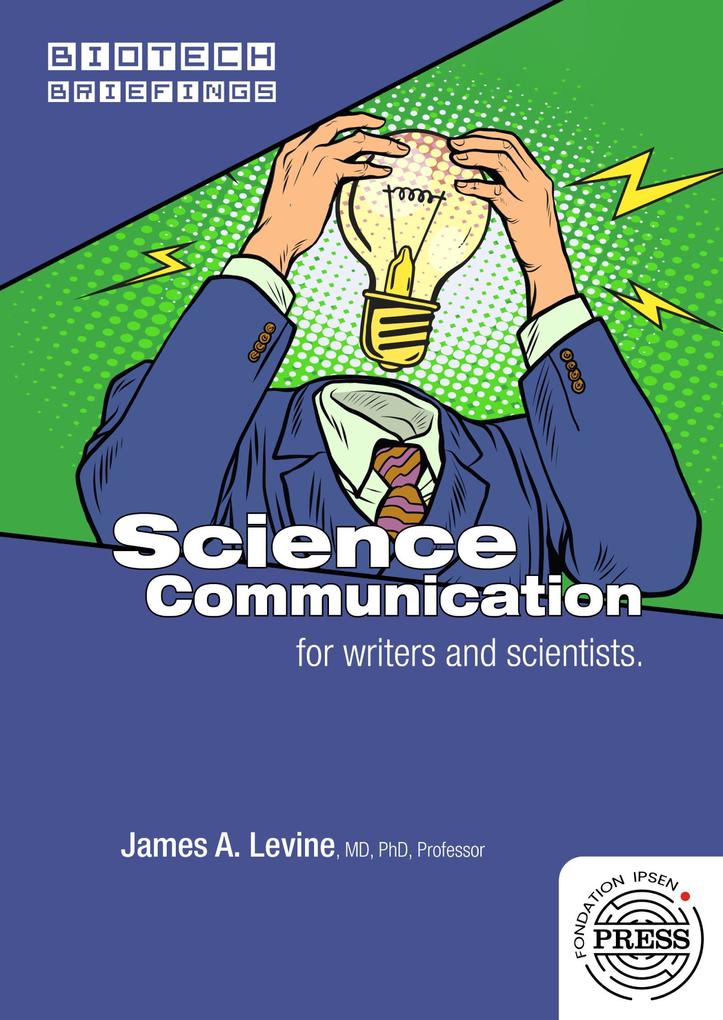
Sofort lieferbar (Download)
Effective and accurate science communication is vital for bridging the gap between scientists and the public. By conveying complex scientific concepts in a clear and engaging manner, writers, communicators, and scientists can increase public understanding and foster informed decision-making. Key elements of effective communication include tailoring the message to the target audience, using simple and relatable language, and incorporating visuals and storytelling techniques. Additionally, transparency and openness about uncertainties and limitations of scientific research build trust.
ABOUT THE AUTHOR
James A. LEVINE, PhD, MD, MBA, Professor Dr. Levine, President Fondation Ipsen, has three decades of experience in the healthcare sector principally at Mayo Clinic. For the last 6 years he has been President of Fondation Ipsen, an international science founda- tion focused on biotech innovation in Rare Diseases.
A physician and scientist, James has published more than 200 articles, six papers in Science and Nature plus articles in journals such as, the New England Journal of Medicine, Lancet and JAMA. He has written four books published in 19 languages in 37 countries. His business training, focused on entrepreneurship, was from Harvard Business School.
With a background in wearable technologies, data gathering and data analytics, and with more than 100 patents and trademarks, Levine helped found 35 companies. He was the Innovator of the Year in the state of Minnesota, the World Trade Fair and NASA. Under the Mayo Clinic NEAT Trademarks, Levine's team delivered scalable health solutions to 72 US corporations.
A great deal of James' work focusses on biotech development, scalable health solutions and business opportunities in underserved regions in the United States, France and low/middle countries such as the Democratic Republic of Congo, Cote d'Ivoire, Afghanistan, Jamaica, Asia, Kenya and India. Consulting to the President of the United States, the US State De- partment, US Army and internationally, James in 2018 was awarded the President's Medal for promoting social embeddedness.
300 million people live with rare diseases without effective cures. Sus- tainable solutions require the efficient use of capital to optimize biotech- nology companies, maximize impact and minimize suffering.
ABOUT THE AUTHOR
James A. LEVINE, PhD, MD, MBA, Professor Dr. Levine, President Fondation Ipsen, has three decades of experience in the healthcare sector principally at Mayo Clinic. For the last 6 years he has been President of Fondation Ipsen, an international science founda- tion focused on biotech innovation in Rare Diseases.
A physician and scientist, James has published more than 200 articles, six papers in Science and Nature plus articles in journals such as, the New England Journal of Medicine, Lancet and JAMA. He has written four books published in 19 languages in 37 countries. His business training, focused on entrepreneurship, was from Harvard Business School.
With a background in wearable technologies, data gathering and data analytics, and with more than 100 patents and trademarks, Levine helped found 35 companies. He was the Innovator of the Year in the state of Minnesota, the World Trade Fair and NASA. Under the Mayo Clinic NEAT Trademarks, Levine's team delivered scalable health solutions to 72 US corporations.
A great deal of James' work focusses on biotech development, scalable health solutions and business opportunities in underserved regions in the United States, France and low/middle countries such as the Democratic Republic of Congo, Cote d'Ivoire, Afghanistan, Jamaica, Asia, Kenya and India. Consulting to the President of the United States, the US State De- partment, US Army and internationally, James in 2018 was awarded the President's Medal for promoting social embeddedness.
300 million people live with rare diseases without effective cures. Sus- tainable solutions require the efficient use of capital to optimize biotech- nology companies, maximize impact and minimize suffering.
Produktdetails
Erscheinungsdatum
30. Juni 2025
Sprache
englisch
Seitenanzahl
148
Dateigröße
1,58 MB
Autor/Autorin
James A. Levine
Verlag/Hersteller
Kopierschutz
mit Wasserzeichen versehen
Family Sharing
Ja
Produktart
EBOOK
Dateiformat
EPUB
ISBN
9782384272167
Entdecken Sie mehr
Bewertungen
0 Bewertungen
Es wurden noch keine Bewertungen abgegeben. Schreiben Sie die erste Bewertung zu "Science Communication" und helfen Sie damit anderen bei der Kaufentscheidung.









